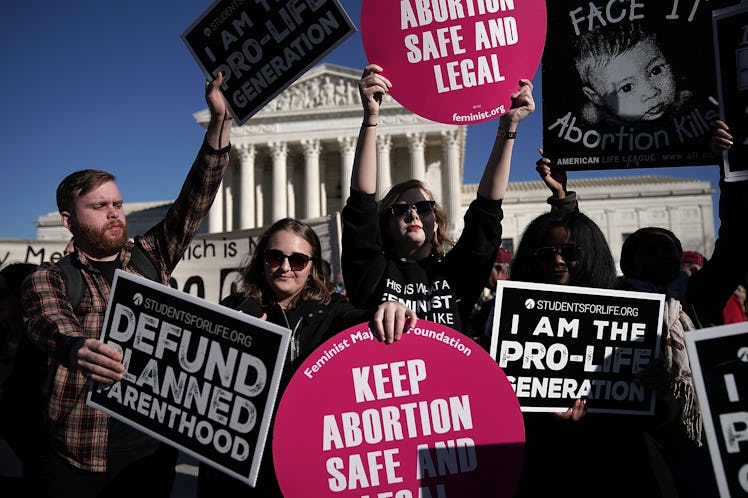
Missouri Is The Latest State Moving To Pass A Restrictive (& Troubling) Abortion Bill
Following controversial anti-abortion laws passed in both Georgia and Alabama, another state is voting to pass a bill that would restrict reproductive rights for residents. So, what's in Missouri's new abortion bill? It's one of the most extreme and disturbing yet.
On Thursday, May 16, CNN reported that Missouri's state Senate has voted to pass HB126, also known as the Missouri Stands for the Unborn Act. This bill would ban abortions after eight weeks of pregnancy, and would only permit them in cases of medical emergencies. However, abortions would still be banned even in cases of pregnancies caused by rape or incest. Per TIME, the bill would also ban abortions based on race, sex, or diagnosis of Down Syndrome, and require a minor seeking an abortion to notify both parents (with some exceptions). The bill also includes a "trigger" function, which would automatically ban abortion in all circumstances save for the health of the parent, should Roe v. Wade, the Supreme Court decision legalizing abortion nationally, be overturned.
The bill passed through Missouri's Republican-controlled Senate by a 24-10 vote on May 16. The bill still needs to go back through Missouri's House of Representatives to progress, and if it passes it will be sent to Missouri Gov. Mike Parson's desk. Parson is expected to sign the legislation, having expressed his support for the bill in the past. According to Slate, Parson has already said he will sign the bill. There is a Friday, May 17, deadline to pass the legislation.
On Wednesday, May 15, Parson addressed the bill during a news conference, where he said the act would make Missouri "one of the strongest pro-life states in the country."
"I made a promise to all Missourians that I would continue advocating and promoting a culture of life here in Missouri," Parson also said during the news conference.
Missouri is yet another state to introduce strict anti-abortion measures, but this is certainly one of the most extreme yet.
Missouri's decision to vote on the anti-abortion measure comes just one day after Alabama Gov. Kay Ivey signed the Human Life Protection Act on Wednesday, May 15, a near-total ban on abortions except in cases where the parent's health is at risk. Like Missouri's bill, the Human Life Protection Act does not allow abortions in cases of rape or incest. In addition, Alabama's bill would make it so that abortion providers could face 10 to 99 years in prison if they perform or attempt to perform the procedure. Barring any legal challenges — which are extremely likely — the law will go into effect in six months.
On Wednesday, May 15, Gov. Ivey announced via Twitter that she signed the bill, stating it served as a "testament" to Alabamians' beliefs. She wrote,
Today, I signed into law the Alabama Human Life Protection Act. To the bill’s many supporters, this legislation stands as a powerful testament to Alabamians’ deeply held belief that every life is precious & that every life is a sacred gift from God.
Other states including Kentucky, Georgia, Mississippi, and Iowa have voted to pass similar "heartbeat bills," which prohibit abortions after a fetal heartbeat is detected, usually around six weeks into a pregnancy — a time when many people aren't even aware that they're pregnant. However, these bans aren't in effect quite yet, having faced immense criticism from reproductive rights groups and concerned residents. On May 10, a federal judge blocked Kentucky from passing the bill (Kentucky Gov. Matt Bevin has vowed to appeal the motion). On Wednesday, May 15, the American Civil Liberties Union (ACLU) filed a lawsuit on behalf of Planned Parenthood and other health providers against Georgia, challenging their six-week abortion ban after Georgia Gov. Brian Kemp signed the bill on May 7.
The future of reproductive health has never been more unclear. Want to know how you can get involved? Here's a few organizations to donate to.